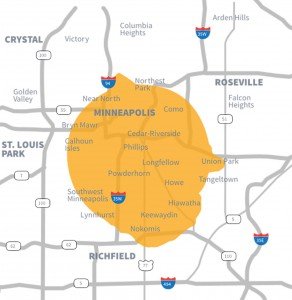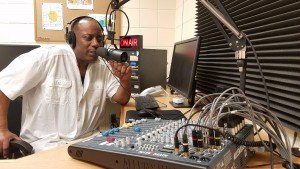By TESHA M. CHRISTENSEN
A new community radio station dedicated to telling the stories of the densely populated, ethnically diverse South Minneapolis area is coming this fall.
After over five years of dreaming and planning, 98.9 KSRM is nearly ready to launch at the Waite House Community Center (2323 11th Ave. S.). A fundraising drive in June raised the money needed to build the antenna.
“Our community really came out to support us with local businesses, nonprofits, and community members collectively donating over $40,000,” said KRSM Radio Manager Brendan Kelly. “Our next step is to finalize construction plans, install the antenna, and then we’ll be ready to go.”
 KRSM is a Low-Power FM station, which means that it will broadcast about five miles in each direction, covering 300,000 listeners in the Southside area. (See map to the right)
KRSM is a Low-Power FM station, which means that it will broadcast about five miles in each direction, covering 300,000 listeners in the Southside area. (See map to the right)
“This is community radio at its very most community,” said Kelly. “If I had my wish, every neighborhood would have something like this.”
He added, “South Minneapolis is a vibrant, diverse, and constantly changing part of our city. It’s home to a large Indigenous population (plus Little Earth, the birthplace of the American Indian Movement, and a Native Cultural Corridor on Franklin). It’s where more Somalis live than anywhere but Mogadishu. It’s where a lot of amazing artists and entrepreneurs and radical organizers call home. Why not build a platform to celebrate and share all of that?”
Online content in 6 languages
The Southside Media Project and 98.9 KSRM is a coalition of neighbors and nonprofits and is one part of Pillsbury United Communities’ Community Media Initiative that aims to provide a platform to raise up stories of the community.
About five years ago, concerned neighbors started meeting regularly with representatives from Pillsbury United Communities (Waite House), Little Earth of United Nations, Hope Community, and Main Street Project to discuss the possibility of creating a new media platform that more accurately reflected the communities, voices, and cultures of South Minneapolis.
Over those five years, the group successfully applied to the FCC for a license to broadcast at 98.9 FM, recruited over 100 volunteers, formed an advisory board, built a studio, led close to 60 free training sessions, launched the website (KRSMradio.org), and began broadcasting 83 hours of content each week.
 Photo left: Greg Fields hosts The G Music Show for 98.9 KRSM Radio. The station hasn’t officially launched yet, but already has weekly content on its web site in six different languages (English, Spanish, Somali, Ojibwe, Hmong, and Haitian Creole). There are shows about mental health, politics, race and identity, food justice, entrepreneurship, architecture, and language, as well as lots of music. (Photo submitted)
Photo left: Greg Fields hosts The G Music Show for 98.9 KRSM Radio. The station hasn’t officially launched yet, but already has weekly content on its web site in six different languages (English, Spanish, Somali, Ojibwe, Hmong, and Haitian Creole). There are shows about mental health, politics, race and identity, food justice, entrepreneurship, architecture, and language, as well as lots of music. (Photo submitted)
The station will be a tool for sharing news, music, storytelling, debate, and public health/safety announcements.
“We haven’t even launched yet, and we already have weekly content in six different languages (English, Spanish, Somali, Ojibwe, Hmong, and Haitian Creole),” observed Kelly.
There are shows about mental health, politics, race and identity, food justice, entrepreneurship, architecture, and language, as well as lots of great music.
“A few of my favorite shows so far are Project 35 (an eclectic music show hosted by Válerie Déus), DesignHER Life (Felicia Perry’s ode to women of color creative entrepreneurs and the challenges they face), and The Jungle (where Adriana Foreman mixes great music with short recordings of dynamic Southsiders sharing whatever is in their heart at the moment...from reflections on student loans to guided meditations to poetry and self-care tips),” said Kelly.
He is also proud of some of the partnerships the station has formed with media makers outside Minneapolis.
“We’re airing fantastic content from reservation radio stations in Leech Lake and White Earth,” remarked Kelly. “We’re sharing Spanish language content from Democracy Now. Monday-Friday at noon, we share nationally syndicated call-in shows made specifically for Latinx communities (Tues./Wed,) and Indigenous populations (Mon./Thur./Fri.).”
Tradition of radio as place for civic conversation
Community radio played a crucial role in steering Kelly’s life in the direction it has taken.
“Radio K (1997-1999) was where I cut my teeth in Minneapolis,” recalled Kelly. It’s where he first tried out DJing and editing audio and recording promos and throwing shows and marketing and speaking in a community space. And it’s where he met local rapper Brother Ali.
“When I moved on from my show, I became Ali’s DJ and spent the next 15 years of my life recording, performing, and traveling... all thanks to community radio,” said Kelly.
In the past, when there were many local stations, the system allowed trusted voices to emerge from the community, Kelly pointed out. “It served as a petri dish for local music sounds. It was a place for civic conversation. We’re honoring that tradition while trying to update it with more attention to equity and representation.”
Representation also about who makes decisions
KSRM representatives have worked with five classrooms of kids from three different local schools, and the aim is to double those numbers next school year.
“But representation is about more than just who we put on the air, it’s about who we put in positions of power,” remarked Kelly.
So they’re working on creating paid internship programs to help orient young folks from the neighborhood with the behind-the-scenes work of running a radio station. They’ve been very intentional to fill their advisory board and the leadership positions on their volunteer committees with people of color and Indigenous folks.
“And our programming committee is spending this year to create an annual review process for each of our shows that will allow the hosts, their peers at the station, and listeners from the community to regularly check in with us about what we’re airing,” said Kelly. “Also, we have formal partnerships with Voices for Racial Justice and Hope Community (including representatives from each sitting on our advisory board) to make sure that we’re always holding ourselves accountable to our mission.”
“But, despite all of this, we will absolutely make mistakes,” Kelly said.
“And when we do,” Kelly added, “we’ll count on the community to lovingly hold us accountable and challenge us to do better.”
Email contact@KRSMradio.org to check in with an idea, criticism, or questions. Want to get involved? Join a volunteer committee, attend one of the free training sessions, or apply to host a show. Learn more on the web site KRSMradio.org under the header “Get involved.”
Comments
No comments on this item Please log in to comment by clicking here